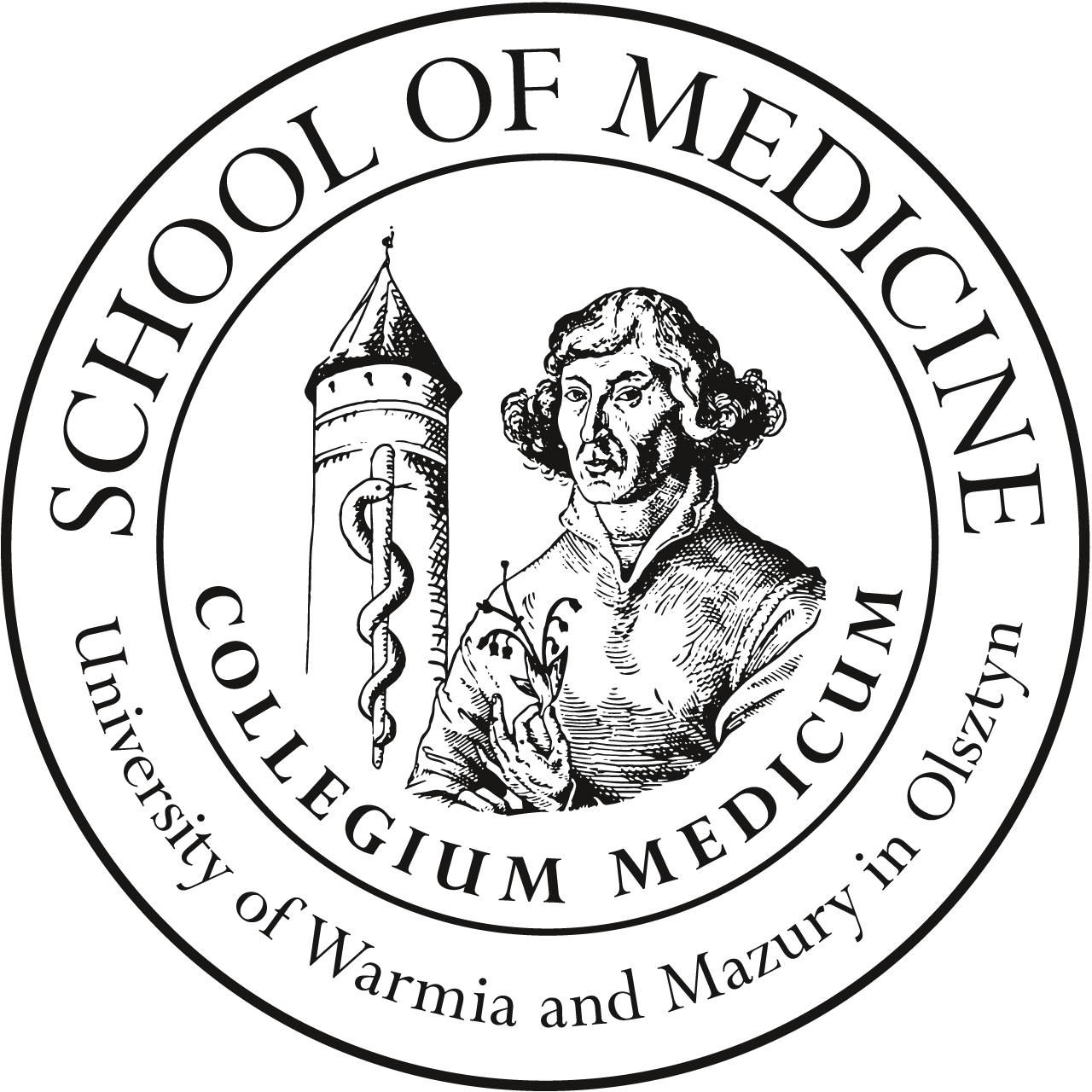REGULATIONS
REGULATIONS AND RULES OF TEACHING
FOR IV YEAR STUDENTS, FACULTY OF MEDICAL SCIENCES
Medicine (English Division)
Subject: Ophthalmology
In the academic year 2025/2026
1. ORGANIZATION DATA
1.1 The name of the unit realizing the subject: Department of Clinical Ophthalmology
1.2. Persons responsible for the implementation of the subject
a. Head of the Dept. of Ophthalmology - Janusz Pieczyński MD, PhD
b. Subject coordinators: Andrzej Grzybowski, MD, PhD, Professor of Ophthalmology;
Janusz Pieczyński MD, PhD
c. Persons teaching the subject:
Andrzej Grzybowski, MD, PhD, Professor of Ophthalmology
Janusz Pieczyński MD, PhD
Patrycja Kuklo, MD
Weronika Wasińska-Borowiec, MD
Mateusz Markiewicz, MD
Katarzyna Kowalczyk, MD
1.3 Time, place and themes of the particular types of classes and credits are included in the documents: study programme, syllabus, schedule and themes of the classes. These documents are available on the Department of Ophthalmology website and on the School of Medicine website (http:wl.uwm.edu.pl/en/students/classes-schedule).
2. CLASSES ARE HELD IN THE FOLLOWING FORMS:
* Lectures
* Seminars
* Exercises/ Classes
Classes, seminars and lectures are held according to the class schedule. The student is obliged to participate in the classes within the group of students, to which he is assigned.
2.1 Exercises.
Exercises take place at the Department of Clinical Ophthalmology WSS, 18 Zolnierska Street (Wojewódzki Szpital Specjalistyczny) and Department of Ophthalmology of Regional Children’s Specialized Hospital, 18A Zolnierska Street (Wojewódzki Specjalistyczny Szpital Dziecięcy)
Clinical exercises are held in subgroups of 5-6 students. Exercises take place at the Clinic, where students have the opportunity to participate in daily activities of the Ophthalmology Ward.
In exceptional cases, the group can be changed among the students between student groups, in consultation with a leader of the year and a teacher.
2.2 SEMINARS
Seminars are held in groups of ca.20 students. The seminars take the form of a multimedia presentation. Seminars are held according to the seminar schedule.
In exceptional cases, the group can be changed among the students between student groups, in consultation with a leader of the year and a teacher.
2.3 LECTURES
All students of the year are obliged to participate in lectures. The lectures take the form of a multimedia presentation. Lectures are held according to the lecture schedule.
3. THE RULES OF STUDENTS PARTICIPATION IN PARTICULAR FORMS OF CLASSES.
3.1. Applies to all classes: exercises, seminars and lectures.
Student has the right to stay in the classroom only in the presence of a teacher. During the exercises, student is not allowed to leave a classroom without a permission of a teacher. During the classes, seminars and lectures student is not allowed to eat or drink, let in unauthorized persons, as well as record classes, take pictures or movies. In exceptional cases, eg. health issues, there may exceptions to the rule after getting permission from a teacher.
Student is obliged to inform immediately a teacher about any emergency situations.
Student bear liability for losses arising from his/her action. Student is obliged to respect the equipment and teaching aids.
In case of any unforeseen organizational changes leader of the year should contact a teacher.
There is a possibility of lectures, seminars and partially exercises to do remotely, with use of e-learning methods, eg. via MS Teams platform or Moodle platform. Final Exam test is done with the use of Moodle platform.
3.2 Exercises
Class attire: protective/ medical clothing must be worn during the classes. The student is obliged to stay in the hospital in clean white, uncreased apron and variable footwear (light sole). Outerwear, bags and personal belongings must be store in the locker room. During the classes jewellery is prohibited.
Note: the student is obliged to know the issues discussed in previous years (exercises, seminars, lectures).
4. CLASS ATTENDANCE, JUSTIFICATION AND MAKING UP FOR THE ABSENCE.
The presence on exercises, seminars and lectures are obligatory:
a) no unjustified excuse is allowed during the semester.
b) In case of an excused absence, the student is obliged to do some abandoned classes (classes, seminars) with another dean's group or to do missing classes on ophthalmology hospital duties with subject teacher (if previous permit of teacher was obtained) , and in the event of absence from lectures, student is obliged to pass the material from the abandoned lecture verbally at the person responsible for lectures or at the person appointed by the Course Coordinator.
In order to justify the absence, the student should:
- present appropriate justification (e.g. medical certificate) at the secretariat of the Department (within 7 days from the end of the dismissal period) and obtain permission to make up for the absence with the designated exercise group (consent from the person conducting the classes with the group in which the absence is to be made up)
- obtain written confirmation of doing the exercise / seminar / lecture and passing the obligatory material. Confirmation should be submitted to the secretariat of the Department within 2 days from the date of crediting.
c) lack of unexcused presence on the exercise, seminar or lecture makes it impossible to obtain a semester.
5. CREDIT OF PARTICULAR FORMS OF CLASSES
A detailed program of activities (lectures, seminars and exercises) is presented in the Syllabus (available on the website of the University).
Lectures are an overview of the most important issues and are an introduction to the classes. Credit is based on attendance.
Seminars are an interactive overview of the most important ophthalmic issues. Credit is based on presentation and speech on one of the randomly selected subjects (each student has a different presentation topic) and attendance. Student can gain from 0 to 10 points for the presentation.
Classes are meant to present ophthalmology in practice (ophthalmologist present work practice, participating in the work of doctors in the ward, in the operating room and the associated clinics). While participating in classes student acquires the basic skills required in the Syllabus of ophthalmology. Student should be acquainted with the practical aspects of ophthalmology first aid. Classes are held at the Department of Clinical Ophthalmology Regional Hospital in Olsztyn. Credit is based on:
- attendance in all classes,
- result of an entering test (anatomy and physiology of the eye, a set of questions made available before exercises),
- presentation of the case during the last class,
- the overall attitude during the classes
Student is obliged to prepare theoretically from existing materials (the list given on the website), or other supplementary materials and suggestions received from a teacher.
The presence on all classes is mandatory.
Each absence from classes or seminars must be excused and passed afterwards:
- at another time (as long as it does not interfere with other classes) or
- during teacher’s duty, after setting an appointment, at the time equivalent to the duration of the exercise or
-by preparing a presentation about subject of missed class
Credit should be established with a teacher.
A sick leave is allowed in case of absence because of a disease.
For suggestions, questions or complaints student has the right and duty to contact with a teacher or a person responsible for the classes- Subject Coordinator: Prof. Andrzej Grzybowski or dr Janusz Pieczyński. Consultations take place in a date and hour agreed both with a student group and a teacher.
The final exam is a multiple-choice final test (80 questions); it is necessary to gain at least 60% of final writing test (e.g.48 points) to pass an exam
The maximum number of points to gain is 80.
Fail: 47 and less points
Sufficient: 48-56 points
Sufficient plus: 57-64 points
Good: 65-68 points
Good plus: 69-72 points
Very good: 73-100 points
The material covered in the final examination includes the topics discussed during the classes and seminars, as well as the required literature.
If student do not pass the first term of final exam, there will be appointed a second term of the exam in the same form (a test containing already 100 questions) with the same grading scale.
If student do not pass the second term of final exam, Head of the Department appoints an additional term for an oral exam (5 questions, of which 4 must be answered correctly to get a sufficient grade).
Student has the right to inquire the writing checks (test) after asking coordinators of the subject.
Literature:
Ophthalmology. A pocket textbok atlas. G. Lang. 3rd edition or newer for English Division students
6. INDIVIDUAL ORGANIZATION OF STUDIES
Students with an individual organization of studies are required to contact the person conducting the subject, Coordinator of the subject and Departments office in order to determine the mode of implementation of the subject. Student is obliged to submit the consent of individual organization of studies given by an authorized representative of the Dean's authorities.
- Regulations for classes of subject Ophthalmology are consistent with the UWM Study Regulations and the procedures in force at the Faculty of Medicine.
- Before starting clinical classes, students are required to read the principles of health and safety and GDPR as well as the principles of epidemiology and civil defense in force at the Hospital in which student takes the classes. The lecturers will familiarize students with the basics of the above principles, and students will sign an appropriate statement about familiarizing themselves with their content.
All issues not included in this regulations will be resolved by the Head of the Ophthalmology.
HEALTH AND SAFETY REGULATIONS
DEPARTMENT OF OPHTHALMOLOGY
1. Before entrance the exercise room or hospital ward, outwear clothes, bags, rucksacks and personal belongings must be left in hospital locker-room.
2. The entrance to the lecture and exercise rooms is allowed only for students of University of Warmia and Mazury in Olsztyn, according to the class schedule actual for Faculty of Medicine. Introducing outsiders to the lecture and exercise rooms is forbidden.
3. During the classes (held in hospital) students should wear white, clean aprons and change footwear.
4. In all classrooms, strict adherence to the principles of cleanliness and regulations of Health and Safety is obligatory.
5. It is forbidden to: eat, drink and smoking cigarettes inside the classrooms. Using mobile phones, recording lectures, taking photos and making videos during the classes is strictly prohibited.
6. A student whose condition indicates the consumption of intoxicants or alcohol may be removed from the course until verification.
7. Note: the area around the Department of Clinical Ophthalmology and the hospital buildings is non-smoking.
8. Before entering clinical classes, students are required to read the principles of health and safety and GDPR as well as the principles of epidemiology and civil defence in force at the Hospital in which student takes the classes.
9. Students are obliged to protect personal data according to GDPR –The General Data Protection Regulation.


